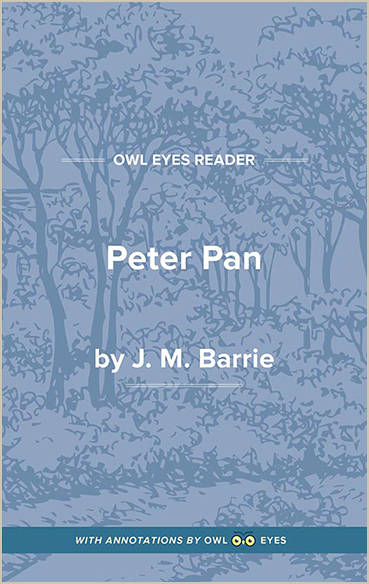Analysis Pages
Themes in Peter Pan
Growing Up: The character of Peter embodies the central theme of childhood and growing up. Barrie uses his narrative to demonstrate the natural transition between childhood freedom and adult responsibility. Peter, “The Boy Who Wouldn’t Grow Up,” chooses to remain a child forever. Peter gets to continue having adventures and living a life of freedom and imagination. However, Peter’s choice means he also misses out on familial love. Some readers may see Peter Pan as a story of how we lose imagination and freedom as we grow up. However, other readers may see the story as demonstrating how growth and change can be hard, but it are a necessary part of life.
Motherhood: Motherhood is represented by Mrs. Darling and Wendy. Peter distrusts mothers because he believes that his own mother betrayed him. However, Peter and The Lost Boys still desire a mother, which is why Peter flies Wendy to Neverland. Even the pirates admit they long for a mother to take care of them. Wendy pretends to be a mother to The Lost Boys, but later wants to return home to her own mother. Some readers may see the depiction of women’s primary role as a mother as a confirmation of stereotypical gender roles.
Themes Examples in Peter Pan:
Chapter 1 - Peter Breaks Through
🔒"rummage in their minds and put things straight for next morning..." See in text (Chapter 1 - Peter Breaks Through)
"Children have the strangest adventures without being troubled by them..." See in text (Chapter 1 - Peter Breaks Through)
"He had his position in the city to consider..." See in text (Chapter 1 - Peter Breaks Through)
"Of course we can, George..." See in text (Chapter 1 - Peter Breaks Through)
Chapter 2 - The Shadow
🔒"So the older ones have become glassy-eyed and seldom speak (winking is the star language), but the little ones still wonder..." See in text (Chapter 2 - The Shadow)
"Wendy was wiser..." See in text (Chapter 2 - The Shadow)
Chapter 3 - Come Away, Come Away!
🔒"Wendy, one girl is more use than twenty boys..." See in text (Chapter 3 - Come Away, Come Away!)
"I want always to be a little boy and to have fun..." See in text (Chapter 3 - Come Away, Come Away!)
"It must be sewn on..." See in text (Chapter 3 - Come Away, Come Away!)
"to see a mermaid!..." See in text (Chapter 3 - Come Away, Come Away!)
Chapter 4 - The Flight
🔒"It just goes out of itself when she falls asleep, same as the stars..." See in text (Chapter 4 - The Flight)
Chapter 6 - The Little House
🔒"O Wendy lady, be our mother..." See in text (Chapter 6 - The Little House)
"A lady to take care of us at last..." See in text (Chapter 6 - The Little House)
Chapter 7 - The Home Under The Ground
🔒"By the way, the questions were all written in the past tense..." See in text (Chapter 7 - The Home Under The Ground)
Chapter 8 - The Mermaids' Lagoon
🔒"would the mother desert her eggs? No..." See in text (Chapter 8 - The Mermaids' Lagoon)
"she was too proud to offer a vain resistance..." See in text (Chapter 8 - The Mermaids' Lagoon)
"she must die as a chief's daughter..." See in text (Chapter 8 - The Mermaids' Lagoon)
Chapter 10 - The Happy Home
🔒"loyal a housewife to listen to any complaints against father..." See in text (Chapter 10 - The Happy Home)
"There is something she wants to be to me, but she says it is not my mother...." See in text (Chapter 10 - The Happy Home)
"It is only make-believe, isn't it, that I am their father?..." See in text (Chapter 10 - The Happy Home)
Chapter 11 - Wendy's Story
🔒"Off we skip like the most heartless things in the world, which is what children are, but so attractive..." See in text (Chapter 11 - Wendy's Story)
"If you knew how great is a mother's love..." See in text (Chapter 11 - Wendy's Story)
Chapter 16 - The Return Home
🔒"it was quite time we came back..." See in text (Chapter 16 - The Return Home)
Chapter 17 - When Wendy Grew Up
🔒"what it really meant was that they no longer believed..." See in text (Chapter 17 - When Wendy Grew Up)

